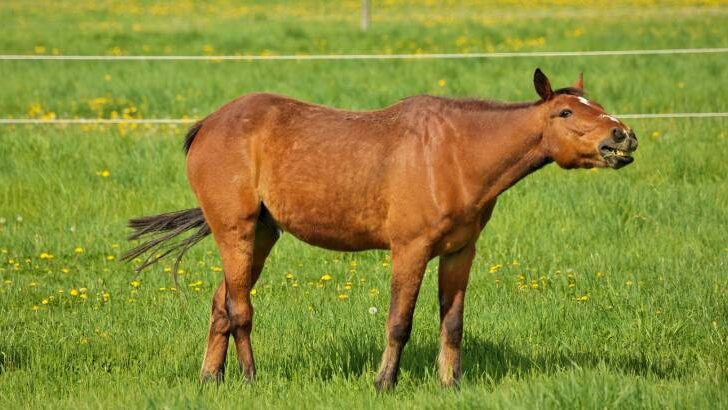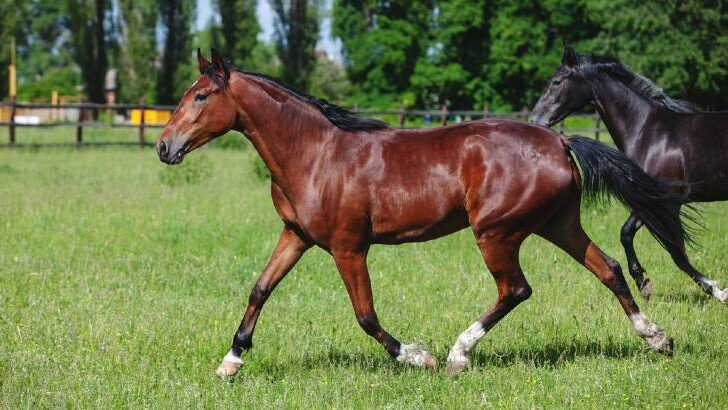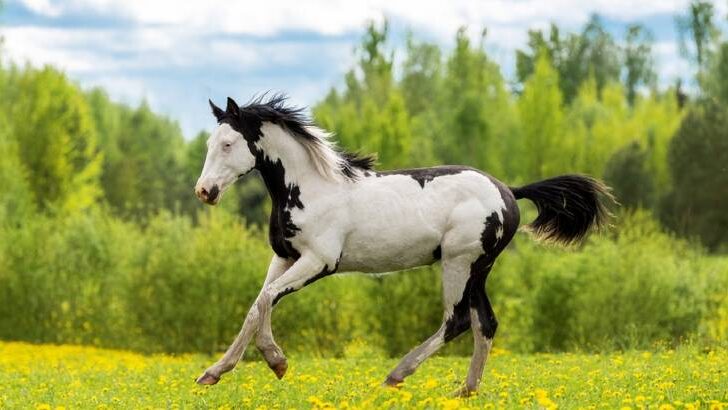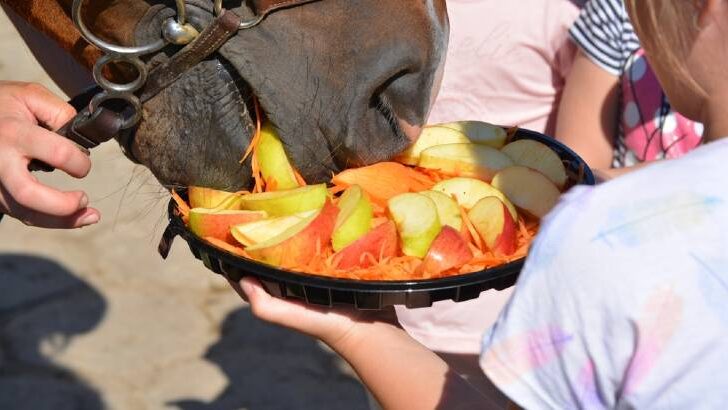Affiliate Disclaimer
As an Amazon Associate I earn from qualifying purchases. It helps me keep the website going. Thank you for your support.
Horses are a wonderful hobby and fantastic companions. They’re also complex creatures with many specific needs and quirks. Like people, they can make bad decisions and develop habits detrimental to their health. For example, It’s common that horses windsuck, especially when stabled. But why do horses windsuck?
Often horses windsuck as a response to one of three things: boredom, stress, or gastrointestinal discomfort. Windsucking can fast turn into a bad habit. Once it becomes a habit, it’s much harder to stop. Excessive windsucking can have negative effects on their health and well-being.
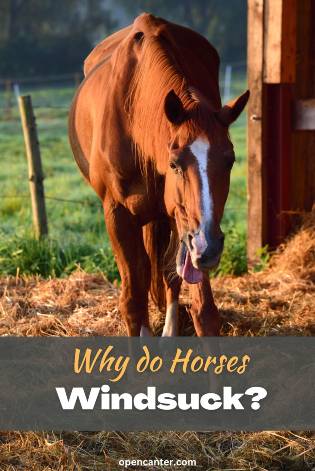
What is Windsucking?
Windsucking is very much what it sounds like – a horse voluntarily sucking in wind. They do this by arching their neck and contracting their abdominal muscles to help them suck in air. It resembles a gulping motion and they’ll grunt or groan as the air blows back out.
Windsucking is often likened to cribbing. While similar, these two behaviors are performed differently. Cribbing does involve sucking in air, but it’s done by placing the top teeth on a surface for leverage to pull the air in. Both are bad habits that can have similar repercussions. Although, cribbing comes with additional risks such as dental problems and property damage. You can read more about the difference between windsucking and cribbing here.
Some horses windsuck only when feeling anxious or placed in a stressful situation. Others turn it into a habit and may spend hours windsucking every day. It’s quick to become a habit because the act of windsucking activates dopamine receptors. In their mind, this rewards the behavior.
Possible Reasons Horses Windsuck
Stress, boredom, and discomfort are three of the biggest causes of windsucking, but these can all develop for many reasons. The best way to determine what’s causing windsucking in a particular horse is to analyze their diet and lifestyle with your vet.
Though not exhaustive, the following are some common reasons horses windsuck:
Diet/Lifestyle
In the wild, horses tend to graze for at least 50-60% of the day, often more. In doing this, they consume lots of low-calorie forage throughout the day. They also move around quite a bit.
Domesticated horses spend more time in stalls and are often fed more calorie-dense grain diets. This isn’t inherently bad, especially for performance horses that do a lot more work than a wild horse would.
However, grain diets tend to be lower in forage and may leave horses without food for longer periods. This is where adequate turnout and hay feedings are imperative. You can read more about how windsucking is linked to diet here.
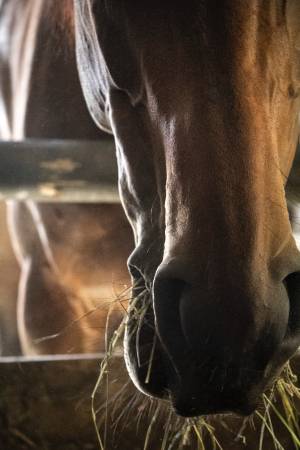
Excessive and prolonged stabling combined with a lack of proper forage can cause both boredom and even anxiety. Without anything to stimulate their bodies and minds, some horses resort to windsucking.
Social Isolation
Horses are herd animals by nature. In the wild and left to their own devices, they travel in packs. This is for protection and companionship. They thrive on social interaction and even physical connections like mutual grooming.
Extended isolation from other horses can lead to boredom, stress, and anxiety. It may be the reason some horses windsuck, as well as develop other habits like weaving, pacing, or cribbing.
Ulcers
Windsucking is related to a higher instance of gastric ulcers. Gastric ulcers can develop for several reasons, including a lack of forage in the diet.
Horses are constantly producing gastric acid, even when they’re not eating. This is why foraging (hay, grass, etc) is important – chewing produces saliva. A horse’s saliva is alkaline and can counteract gastric acid, thus preventing ulcers from forming.
A horse that suddenly starts windsucking should be checked for ulcers. If stomach ulcers have developed, they may use windsucking to produce more saliva, helping the ulcers heal.
Nervous Personality
Some horses are more reactive, nervous, and spooky than others. This is normal and often manageable, but it does put them at higher risk. If they’re more easily stressed out, they may be more likely to windsuck in stressful situations. If not addressed, this can lead to a permanent habit forming.
Some Horses Windsuck as Foals
Weaning is almost always going to be at least a little stressful. Unfortunately, this leaves even babies vulnerable to developing a windsucking habit.
There are many different schools of thought on weaning. Some believe in a “cold turkey” approach, while others take it very slowly. Many owners fall somewhere in between. The reality is, though, that foals who are suddenly removed from their mothers may be more likely to windsuck.
This is also true of foals housed primarily in stables and not given adequate forage. The best weaning methods for preventing a windsucking habit include lots of turn-out time and forage.
Why is it a Problem When Horses Windsuck?
Unfortunately, windsucking isn’t just an annoying boredom buster – unlike other peculiar horse behavior it can be a real problem. Perhaps the biggest and most fatal concern is colic. When horses windsuck and crib, it can put them at a higher risk of colicking.
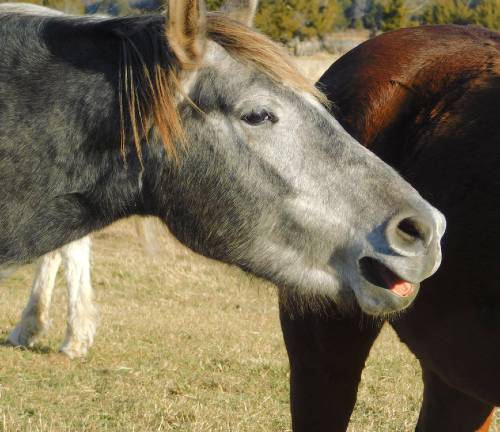
While colic is one of the primary concerns for all horse owners, there are several other implications to be aware of:
- Neck strain. Windsucking requires the horse to flex and use their neck muscles each time they suck in. Too much windsucking can cause strain and tension in these muscles. If it builds up too much, the tension can spread to the shoulders as well.
- Weight loss. If a horse spends too much time windsucking, they spend less time eating and foraging. They’re also expending more energy. Weight loss can be a concern when horses windsuck frequently throughout the day.
- Gastric ulcers. Gastric ulcers can be the cause of windsucking, but they can also be the result! The constant muscle contractions put pressure on their stomach lining. This can prevent regular blood flow and may cause ulcers to form.
Windsucking Prevention
Once a horse develops a habit of regular windsucking, it can be extremely hard to break. This is why prevention is key. Even if your horse doesn’t seem at risk, keep a few key things in mind to prevent them from becoming vulnerable:
- Regular outside time. Of course, things like injuries and severe weather might make turnout impossible for a time. But regular foraging, movement, and exercise are necessary for a healthy horse.
- Lots of forage. In addition to their grain feedings, always offer some combination of daily grazing, hay, haylage, or other low-calorie foraging foods.
- Let them socialize. Some horses must be turned out alone due to behavior or medical issues. Even so, make sure they can at least see other horses over the fence.
- Mental stimulation. There are many things you can do to keep a stabled horse occupied! Jolly balls, salt licks, or even homemade activities can help them reduce boredom when inside.
Windsucking Treatment
- Collars. Often called “crib collars” or “anti-windsucking collars” these are straps you can get that secure around a horse’s throat. Some people swear by them and others don’t believe in them at all. This one is up to you, but they are known to work on some horses.
- Treat for/prevent ulcers. If ulcers are the culprit, treating them may do the trick. The earlier the better though, as they can still develop a habit after the discomfort is gone.
- Surgical intervention. Though controversial, some surgeries have varying success rates. Most involve removing parts of muscles and/or nerves to physically prevent the horse from windsucking. However, they often have undesirable potential side effects and can be stressful for the horse. It’s best to talk to the vet about this one.
- Acupuncture. Not too many studies have been done on this. However, one found that 67% of horses either stopped or reduced their windsucking behavior. Acupuncture comes with other benefits as well, and it’s a lot less invasive than surgery.
Final Thoughts
When horses windsuck, it’s often a sign they’re stressed, bored, or uncomfortable. Take it as an opportunity to analyze your horse’s lifestyle and make improvements. If you are thinking of buying a horse that windsucks, there are a few things to consider. You can read more about that here.
While windsucking can have some negative implications, it’s a common habit among horses. Thankfully, there are things you can do to combat the habit. Plenty of afflicted horses live long and happy lives!

